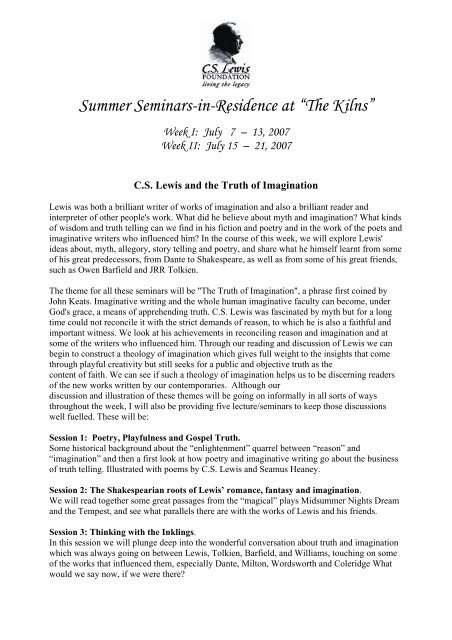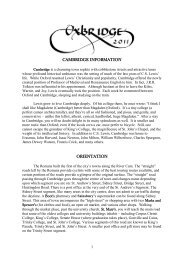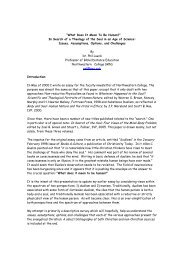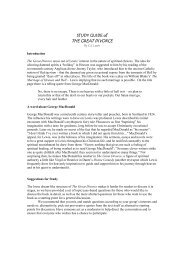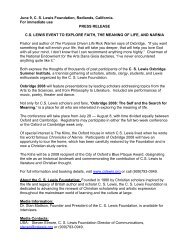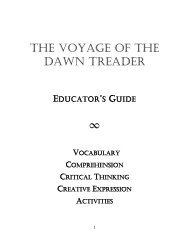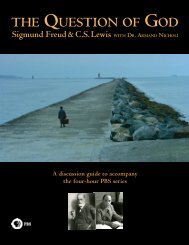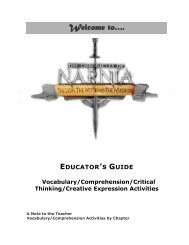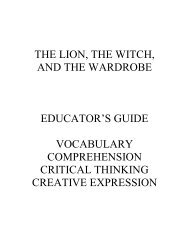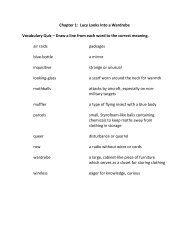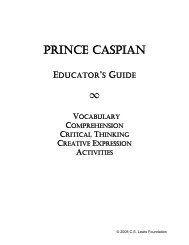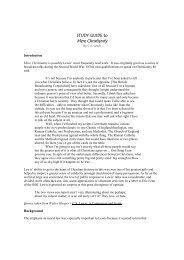My theme for the seminars will - CS Lewis Foundation
My theme for the seminars will - CS Lewis Foundation
My theme for the seminars will - CS Lewis Foundation
You also want an ePaper? Increase the reach of your titles
YUMPU automatically turns print PDFs into web optimized ePapers that Google loves.
Summer Seminars-in-Residence at “The Kilns”Week I: July 7 – 13, 2007Week II: July 15 – 21, 2007C.S. <strong>Lewis</strong> and <strong>the</strong> Truth of Imagination<strong>Lewis</strong> was both a brilliant writer of works of imagination and also a brilliant reader andinterpreter of o<strong>the</strong>r people's work. What did he believe about myth and imagination? What kindsof wisdom and truth telling can we find in his fiction and poetry and in <strong>the</strong> work of <strong>the</strong> poets andimaginative writers who influenced him? In <strong>the</strong> course of this week, we <strong>will</strong> explore <strong>Lewis</strong>'ideas about, myth, allegory, story telling and poetry, and share what he himself learnt from someof his great predecessors, from Dante to Shakespeare, as well as from some of his great friends,such as Owen Barfield and JRR Tolkien.The <strong><strong>the</strong>me</strong> <strong>for</strong> all <strong>the</strong>se <strong>seminars</strong> <strong>will</strong> be "The Truth of Imagination", a phrase first coined byJohn Keats. Imaginative writing and <strong>the</strong> whole human imaginative faculty can become, underGod's grace, a means of apprehending truth. C.S. <strong>Lewis</strong> was fascinated by myth but <strong>for</strong> a longtime could not reconcile it with <strong>the</strong> strict demands of reason, to which he is also a faithful andimportant witness. We look at his achievements in reconciling reason and imagination and atsome of <strong>the</strong> writers who influenced him. Through our reading and discussion of <strong>Lewis</strong> we canbegin to construct a <strong>the</strong>ology of imagination which gives full weight to <strong>the</strong> insights that comethrough playful creativity but still seeks <strong>for</strong> a public and objective truth as <strong>the</strong>content of faith. We can see if such a <strong>the</strong>ology of imagination helps us to be discerning readersof <strong>the</strong> new works written by our contemporaries. Although ourdiscussion and illustration of <strong>the</strong>se <strong><strong>the</strong>me</strong>s <strong>will</strong> be going on in<strong>for</strong>mally in all sorts of waysthroughout <strong>the</strong> week, I <strong>will</strong> also be providing five lecture/<strong>seminars</strong> to keep those discussionswell fuelled. These <strong>will</strong> be:Session 1: Poetry, Playfulness and Gospel Truth.Some historical background about <strong>the</strong> “enlightenment” quarrel between “reason” and“imagination” and <strong>the</strong>n a first look at how poetry and imaginative writing go about <strong>the</strong> businessof truth telling. Illustrated with poems by C.S. <strong>Lewis</strong> and Seamus Heaney.Session 2: The Shakespearian roots of <strong>Lewis</strong>’ romance, fantasy and imagination.We <strong>will</strong> read toge<strong>the</strong>r some great passages from <strong>the</strong> “magical” plays Midsummer Nights Dreamand <strong>the</strong> Tempest, and see what parallels <strong>the</strong>re are with <strong>the</strong> works of <strong>Lewis</strong> and his friends.Session 3: Thinking with <strong>the</strong> Inklings.In this session we <strong>will</strong> plunge deep into <strong>the</strong> wonderful conversation about truth and imaginationwhich was always going on between <strong>Lewis</strong>, Tolkien, Barfield, and Williams, touching on someof <strong>the</strong> works that influenced <strong>the</strong>m, especially Dante, Milton, Wordsworth and Coleridge Whatwould we say now, if we were <strong>the</strong>re?
2007 Summer Seminars-in-Residence Week I-IISession 4: History, Story, <strong>My</strong>th, Allegory, and Parable. What’s <strong>the</strong> difference?We <strong>will</strong> look toge<strong>the</strong>r at <strong>the</strong> way <strong>Lewis</strong> understood and used <strong>the</strong>se different genres and try toillustrate and explore <strong>the</strong>m all with examples drawn entirely from <strong>Lewis</strong>’ own work. Often <strong>the</strong>seelements are combined; we can probably discern all of <strong>the</strong>m in different ways and places within<strong>the</strong> Chronicles of Narnia and <strong>the</strong> Space Trilogy. We <strong>will</strong> draw largely on <strong>Lewis</strong>’ fiction andpoetry <strong>for</strong> this session.Session 5: That was <strong>the</strong>n, this is now.What happens if we take <strong>the</strong> best ideas about <strong>the</strong> “Truth of Imagination” which we have foundthrough <strong>Lewis</strong> and <strong>the</strong> Inklings and apply <strong>the</strong>m to contemporary writing, music and cinema?Who is out <strong>the</strong>re, what’s good and what isn’t? Let’s share our reading and pool our resources.Can we make a constructive Christian critique of <strong>the</strong> Harry Potter series, The Pullman novels, or“science fiction” that draws heavily on allegory, such as <strong>the</strong> Matrix? We need to engage with<strong>the</strong>se works in a way, which nei<strong>the</strong>r demonises <strong>the</strong>m, nor simply capitulates to <strong>the</strong>ir manyhidden (and not so hidden) agendas.Finally, can <strong>Lewis</strong>’ ideas help us not just to be discerning readers, but also to be better writers?We <strong>will</strong> try to focus on those insights that <strong>will</strong> help people who are trying to write imaginativeChristian literature today.


